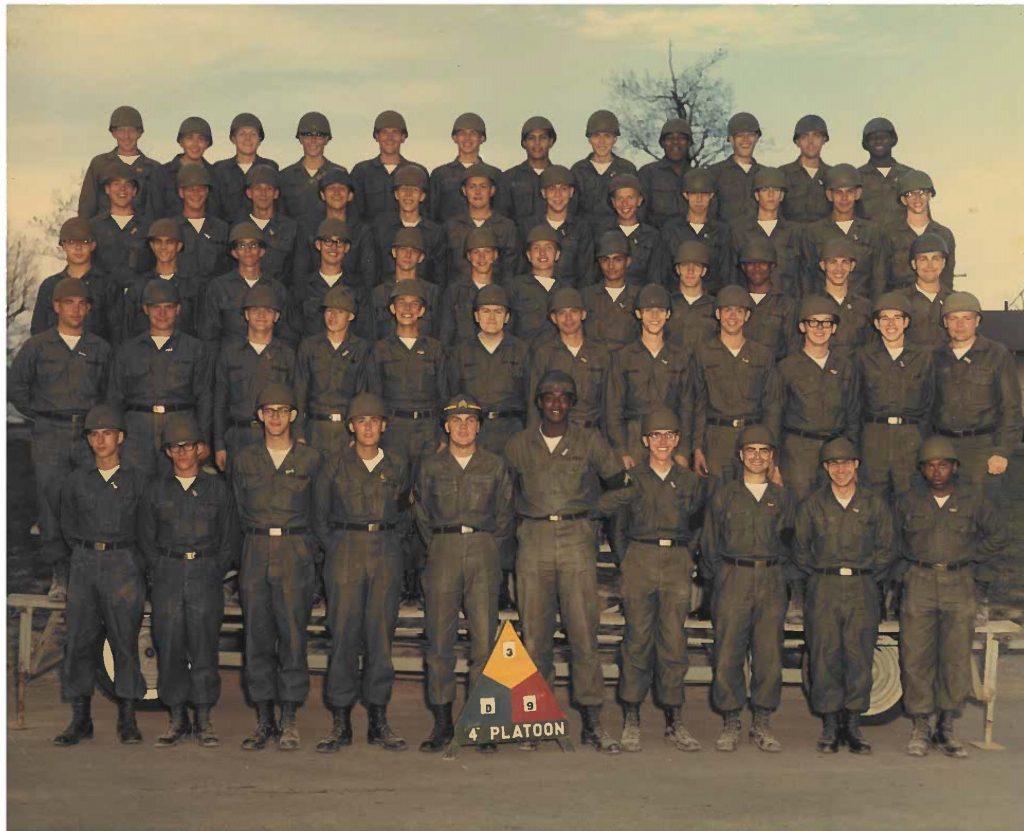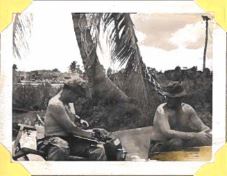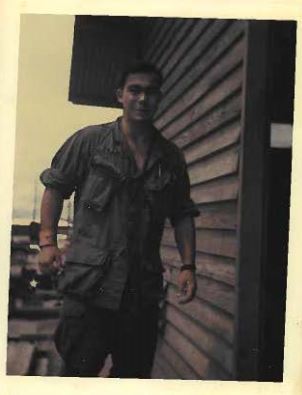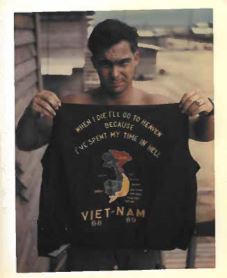I don’t want you to worry but I am in the hospital with fragments but its not that bad (I didn’t even want to go). Lieutenant Dave said it would give me a few days off while they checked me out so don’t worry about me. That will screw up mail for awhile but keep writing anyway as it will catch up with me. I will write you as much as possible and don’t worry.
Ps God is with me.
Letter from Dennis Tilley to his mother March 16, 1969
Wet, sweaty, mucky, and tired, Dennis E. Tilley made the ultimate sacrifice defending against the spread of communism in South Vietnam. Of the 303,700 U.S. military troops wounded in Vietnam, Tilley was one of them (Doyle & Lipsman, 1981, 9). With his courage not being unnoticed, Tilley was one of the many members of the 9th infantry that fought for something larger than the United States of America. This is Tilley’s story brought forward through personal interviews and documents.

Dennis Tilley was born April 2, 1947 to Elizabeth and Adrian Tilley. Born in Kalamazoo Michigan, Tilley’s father was a metal worker in the manufacturing industry. Shortly after Tilley was born, his mother Elizabeth had made the decision that returning home to Elk Rapids, Michigan was a priority for the family. Returning to the town presented the opportunity for the family to get into the hospitality industry. With a mother that had not worked in the past, and a father who had quit his job to move to Northern Michigan, the family invested in the “Buena Vista” cabins. The cabins sat on 200 feet of lake shore frontage on West Grand Traverse Bay. Tilley spent his childhood folding and delivering towels to the cabins, while during his free time he would sled down the dunes that housed themselves between the property the family owned and Bass Lake, a small inland lake on the east side of the property.
As time continued on, Tilley found himself pumping gas and servicing cars at the local gas station. He was eighteen years old at the time, and had not yet found his calling. Still living in Elk Rapids, Tilley continued his help within the family business. “Once I was old enough, my job was to close down the cabins for the winter. I still worked at the gas station, but closing cabins in the winter and opening them in the spring was my job” Tilley stated. It was not until Tilley was twenty-one years old that his priorities had changed. Being a late draft letter(Tilley was drafted later than a majority of young men), in March of 1968 he received his draft notice and no longer would closing or opening the cabins be his job. “Timid of change and the absence of everything I had ever worked for, I wasn’t scared of going to war. I was more upset about having to leave my family if anything,” Tilley said. Having only two weeks to prepare, he said goodbye to his family at the Detroit airport and was flown to Fort Knox, Kentucky, where he would fulfill his basic training requirements. Tilley spent eight weeks at Fort Knox “getting into shape and shooting guns” he stated. From there it was off to AIT training in Fort Polk, Louisiana where he started his infantry training. Scoring high on a placement exam to be a missile mechanic, that was far from what Tilley found himself doing. Him and one other cadet scored well in the missile mechanic category, with only one position to fill, the other cadet was sent to Germany and Tilley was told he would be sent to Vietnam. Having two weeks to arrive in Oakland, California, he took a short trip back to Elk Rapids before finding himself on a plane to Saigon Vietnam in the late summer of 1968. It was here that Tilleys time in the 9th Infantry division would see its full course.

On February 1, 1966, under the request of General Westmoreland, the 9th infantry division was established in the United States (Hunt, 2010, 8). South Vietnam was struggling to keep communist Viet Cong and North Vietnamese troops from taking control of southern territories. The south, unlike the north, is geologically at sea level which presented wet conditions that were ideal for rice farming. With control of this crop, the south was capable of maintaining control of the war, due to it being an economical superpower. With the grip of the communist north squeezing tighter and tighter, General Westmoreland ordered the construction of the military base “Dong Tam” meaning “united hands and minds” in January of 1967 (Hunt, 2010, 9). With U.S. military forces being essential in the south, Dong Tam sat at the center of the Mekong Delta in hopes of helping the South Vietnamese win the war.

After Tilley’s arrival in Saigon he was first commissioned to perform the task of testing boots for all infantry troops. Due to the wet conditions of the South and the memories World War I had left of soldiers and their extreme cases of “trench foot,” boots were very important at the time. Tilley and other infantrymen would be outside with their feet in the mud for hours at a time. Tilley referred to it as a “gravy job.” After the engineers in Saigon had become aware of this and upset these men were doing such an easy job, the infantrymen were removed from their boot duties. With the Tet offensive emerging, Tilley was sent to Dong Tam to carry out the duties the 9th infantry was created to do, which was to “search and destroy,” he stated. With the stage of a suprise attack set, on January 30, 1968 the Tet offensive had begun (Jennings,1985, 108). The communist north and the Viet Cong had planned to launch their largest offensive maneuver in hopes of washing the United States out of the war. The strategy was to attack points of major importance in the south. Although Saigon was one of many hubs to under go this harassment, these offensive maneuvers were carried south by the Viet Cong. As Tilley stated before, the main goal of the 9th infantry was to search and destroy, doing so would disrupt these attacks before they would happen. After a conversation with a Sergeant in Saigon, Tilley had his heart set on walking point for an infantry unit. He was told that carrying a radio makes you the first man to be shot at, and being a machine gunner makes you the second Tilley stated in his interview. The main goal of the Viet Cong was to cut communications with reinforcements and then take down the unit. The next was the machine gunner. Taking out the soldier with the heavy artillery in the unit would allow for an easier fire fight between communist forces and the US infantry units. With his height falling well under six feet, an impressive amount of agility, and an impressive amount of hearing ability, it had seemed Tilley had found his calling. “I could hear the drop of a feather anywhere in the jungle which is what made me good at what I did. They would have booby traps so well placed most of the time that hearing the snap of the pin on the grenade was the only way to know where they were” Tilley explained.
It was crucial that with the rise of aggression in the south, and the unpredictable maneuvers of the Viet Cong, soldiers be equipped with the proper tools of war. Firing 5.56 caliber bullets, and up to 900 rounds per minute, the M16 was the most common weapon infantrymen like Tilley were equipped with (History.com Editors,2011). With the thick foliage that grew in the delta, the M16 was optimum for the warfare conditions men would face. Being very useful for infantry troops, “a machine gunner would always run with their group” Tilley stated. The machine gun of choice in the Vietnam war was the M60. Able to fire up to 550 rounds in a short succession, men carrying the M60 were limited due to the weight of not only the gun, but the ammunition it needed (History.com Editors,2011). Tilley also talked about the “thumper” or M79. “It looked like a little sawed-off shotgun with a 2 inch barrel, we could use HE (High explosive), rounds, illumination rounds, and regular shotgun rounds” he explained.

Well-equipped and trained to carry out the duties of the 9th Infantry, Tilley, alongside many other men, were sent out to protect against the rushing forces involved in The Tet Offensive. Running sweeps was the primary duties infantrymen carried out. Tilley stated that it was crucial that units continuously sweep different territories keeping Viet Cong attacks from falling on Dong Tam. “I would go out and run sweeps with the same ten or so guys, give or take a couple. Sweeps would include being flown out to a location, being dropped off, and clearing the different villages and locations back to Dong Tam or wiring explosives and sitting in rice patties all night clearing any potential threats (Tilley).”
In understanding the Vietnam war, it is important to understand the role that infantrymen as a whole played in the war. Not only being sent out to “search and destroy” men like James Willbank, infantry duties varied. Willbank joined the 18th division of the Army of the Republic of Vietnam as a U.S. Army advisor with the 48th Infantry Regiment in February of 1972 (Willbank, 2019). Willbanks duties lied in teaching Vietnamese troops how to properly carry out U.S. Infantry duties on an individual level so the gradual withdrawal of U.S. troops from the war would not lead to a Vietnamese Republic defeat. “I departed Vietnam in December 1972 feeling that the ARVN soldiers had a good chance of successfully defending themselves once all U.S. troops were gone after a gradual withdrawal that had begun in 1969 (Willbank, 2019).

After running point in his unit for several months without losing a single man, Tilley was sent an artillery sergeant to run his unit. As a fill in, it was prominent that the area of expertise of the sergeant was not scouting the jungle. Out to clear territory that Tilley’s unit had not yet cleared, his new sergeant insisted that Tilley’s unit press forward on a cut that was made to a known communist village that was nearly 200 yards ahead of where the men conversed. After expressing his opinion about how the route was going to be littered with booby traps, the sergeant insisted his knowledge was superior to Tilley’s and that was the route to be taken. Following the orders of command, Tilley pressed forward at the request of his superior. After walking through a booby trap and ordering his unit to get down, Tilley sprinted forward to bear the blast. In his sprint forward, Tilley hit a second booby trap which he was not aware of. After stopping to turn around, the second booby trap had exploded sending Tilley off his feet. “I didn’t know what had happened. The next thing I knew I had all my guys around me asking if I was okay. I looked down at my arm and saw that it was torn up but felt fine to keep going. One guy told me to hang tight and that a chopper was on the way. The next thing I knew, I woke up in a bed in Saigon with my leg casted and my arms bandaged all the way down to my hands.”
Flushed with anger, Tilley was persistent on having a word with the artillery sergeant he was performing his duties under. Reinforced by a Lieutenant that had come to see him, he told Tilley that he would never have to see that man again. While in the hospital Tilley wrote his mother one last time…
Well I am coming home. Right now I am in Japan and I will be in the States the 28th or 29th of March and I am fine so don’t worry about me. Please stop writing me as I won’t get any of the letters you send me anyway and I will call you when I get to the States. Oh, by the way I made E5, how about that? Well there isn’t much more to write about and I will close for now, your loving son Dennis. PS don’t worry about me I am ok.
Letter from Dennis Tilley to his mother March 20, 1969
It was at this time Tilley would make the rank of Sargent. With his courageous actions Tilley was promoted, not only because of the leadership skills he possessed, but also to guarantee the treatment he would get in the hospitals was nothing less than the best. Men without rank were treated much different than men with rank in hospitals Tilleys superiors told him, which is why they promoted him. Today Tilley not only has scars to help him remember the time he served in Vietnam, but also a Purple Heart and Bronze Star to represent the sacrifices he made. Although being recognized for his service in many ways, it was Tilley’s closing statement that brought forward the soldier he truly was. “I was just like every other guy that was sent over there to do a job. As far as I’m concerned… I was just very lucky. The true heroes are the ones that weren’t so lucky.”
Primary Sources
- Tilley, Dennis. Personal Interview. 21 September 2019
- Dennis Tilley to Elizabeth Tilley, 16 March 1969. Original in possession of Dennis Tilley.
- Dennis Tilley to Elizabeth Tilley, 20 March 1969. Original in possession of Dennis Tilley.
- Willbanks, J. H. (2019). Honoring the Soldiers of South Vietnam. Vietnam, 32(1), (Sp)RT18-(Sp)RT21.
Secondary Sources
- Doyle, E., & Lipsman, S. (1981). The Vietnam Experience Setting the Stage. Boston, MA:Boston Publishing Company.
- History.com Editors. (2011, August 2). Weapons of the Vietnam War. Retrieved October 11, 2019.
- Hunt, I. A. (2010). The 9th Infantry Division in Vietnam: unparalleled and unequaled. Lexington, KY: University Press of Kentucky.
- Jennings, P. (1985). Battles of the Vietnam War. New York: Exeter.
For Further Reading
- Combat Bandsman: Memoir of a Tour in Vietnam with the 9th Infantry Division, 1969 by Robert F. Fischer
- The 9th Infantry Division in Vietnam: unparalleled and unequaled by Major General Ira A. Hunt Jr.
- 9th Infantry Division (Wikipedia)
- Troops of the 9th Infantry Division ( mrfa.org)

